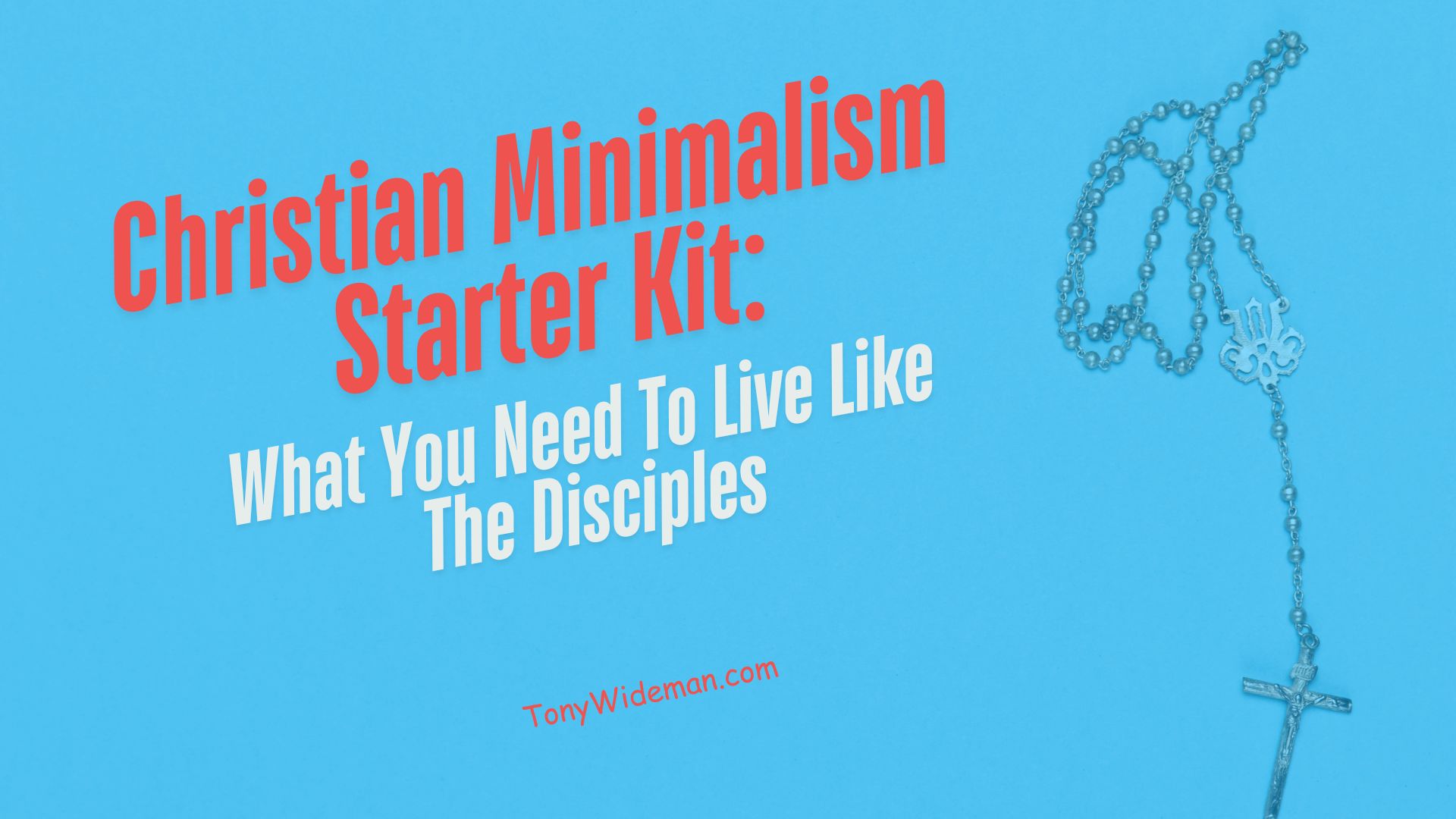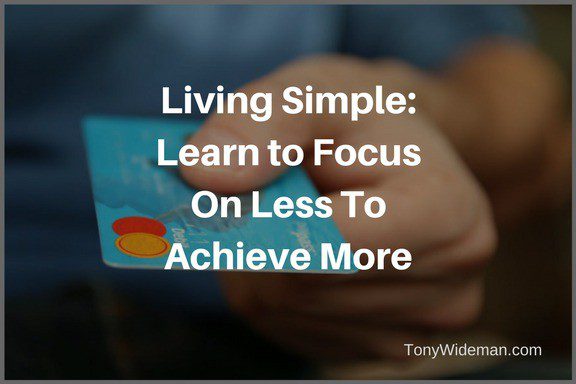Christian Minimalism Starter Kit: What You Need To Live Like The Disciples

Christian minimalism has started to catch on, and it’s not just about decluttering your closets or living in a white, empty room. At its heart, it’s rooted in Jesus’ teachings and the example His disciples set. Letting go of what distracts and living with hands open to God and neighbor is foundational. I’m always surprised at how freeing it can feel to strip things back to the basics and focus on what matters most. If you’ve ever wondered how to start living like the disciples, a Christian Minimalism Starter Kit is a solid way to get your feet wet.
What Is Christian Minimalism?
Christian minimalism is all about making room for more of Jesus and less of the noise. That means letting go of extra possessions, busyness, and anything that pulls me away from a deeper relationship with God. The early disciples lived not because austerity was a competition but because they were freed up to focus on their calling and the people around them. Minimalism, in this sense, isn’t really about aesthetics; it’s more about spiritual and practical simplicity.
While some popular minimalist lifestyles center on self-care, Christian minimalism leans into selflessness, generosity, and faith in God for day-to-day needs. The focus is on building habits and spaces where faith can grow, and distractions take a backseat.
Minimalism is more than a modern lifestyle trend—it is a profoundly spiritual posture that mirrors the life and teachings of Jesus Christ. As we simplify, we strip away distractions, reduce dependency on materialism, and make space to follow Christ more intentionally. Below, we explore powerful, faith-driven ways minimalism helps us live like Jesus, fostering spiritual clarity, purpose, and obedience.
The Simplicity of Jesus: A Blueprint for Christian Minimalism
Jesus lived with radical simplicity. He had no home of His own, traveled light, and focused entirely on the will of his Father. Embracing minimalism allows us to imitate His example, stepping away from consumer-driven culture and into a Kingdom-centered life.
- Matthew 8:20: “Foxes have dens and birds have nests, but the Son of Man has nowhere to lay his head.”
This verse calls us to a lifestyle unburdened by possessions. A minimalist approach frees our hearts from ownership obsession, making room for mission, ministry, and meaningful connection with God.
Essential Items for the Christian Minimalism Starter Kit
A Christian Minimalism Starter Kit doesn’t need to be complicated. It’s designed to highlight many resources that support daily life, prayer, and meaningful connection instead of cluttering it all up. Here’s what I’ve found helpful:
- A Simple Bible: A good, easy-to-read Bible, in print or digital form, becomes the heart of your day. The disciples kept Scripture at the center, so having one Bible you truly use makes a big difference.
- Basic Journal or Notebook: A small, sturdy notebook is excellent for prayer requests, gratitude lists, and notes from your Bible reading. It’s less about tracking everything you’ve done and more about being present with God.
- Reusable Water Bottle or Mug: You don’t see Jesus or the disciples lugging fancy gear. One washable coffee, tea, or water cup keeps things easy, green, and free of extra stuff.
- Cross or Simple Reminder: I like having a small cross, icon, or faith reminder somewhere at home or in my bag. It helps keep my focus on Christ, especially when things get overwhelming.
- Reliable Bag or Satchel: If you’re often on the go, a sturdy bag holds the basics: a Bible, journal, and small snack. Think less “emergency kit ” and more “ready for the day.”
I’ve seen some people overdo it when they first try minimalist living, but it does pay off to keep it focused and prayerful. It’s about tools that serve your faith, not stuff that fills your life.
Minimalism Cultivates a Heart of Service
Jesus served others sacrificially—minimalism fosters margin in our lives—margin for rest, hospitality, listening, and loving well. When we are not overwhelmed by clutter or commitments, we can respond with the availability and attentiveness of Christ.
Galatians 5:13: “Through love serve one another.”
By minimizing distractions, we maximize our capacity to serve with joy.
Detachment From Possessions: A Spiritual Discipline
Jesus challenged the rich young ruler to sell everything and follow Him. This was not just about charity—it was about heart posture. True discipleship demands we hold loosely to earthly things.
Key Benefits:
- Increased Generosity: With fewer material desires, we can give more.
- Greater Trust in God: Releasing excess cultivates dependency on God’s provision.
- Spiritual Focus: Detachment nurtures clarity and spiritual awareness.
Adopting the Mindset: Living Like the Disciples
Living like the disciples is less about copying their two-thousand-year-old travel habits and more about the values that shaped their lives. Here’s what that looks like in practical terms:
- Trust in God’s Provision: The disciples left behind jobs, routines, and security because they trusted Jesus for what they needed daily. Trust isn’t always easy, but the less you rely on “just in case” stuff, the more your faith muscle grows.
- Focus on Relationships, Not Possessions: Their time was spent in community, serving others, and sharing what they had. Prioritizing people above things builds a richer life.
- Simplicity in Schedule: Instead of maxing out every calendar slot, the disciples carved out time for prayer, rest, and listening, directly from Jesus’ example. Making room for “interruptions” and prayerful moments can matter as much as your stuff.
- Generosity and Hospitality: They shared easily, whether food, shelter, or support. Living with less frees up space, time, and money that can be shared with those in need.
I’ve found that journaling and regular reflection are super helpful for tracking how these values take shape in daily life. Sometimes, they reveal where I’m getting bogged down by stuff I don’t need.
Time Stewardship: Redeeming the Hours
Jesus was never in a hurry, yet He fulfilled His divine mission perfectly. Minimalism teaches us to simplify schedules and prioritize Kingdom work. Time is a sacred gift. We steward it well by saying “no” to busyness and “yes” to what truly matters.
Minimalist Practices That Honor Time:
- Decluttering calendars to preserve Sabbath rest
- Structuring routines around prayer and study
- Choosing fewer but more intentional commitments
Contentment Is Counter-Cultural—and Christlike
Hebrews 13:5: “Keep your lives free from the love of money and be content with what you have.”
In a world of constant upgrades and comparison, Christian minimalism helps us reclaim contentment. Jesus modeled gratitude for the daily bread. He didn’t strive for more; He walked in fullness. Following Him teaches us to embrace sufficiency and let go of trying.
Freedom from Anxiety Through Simplicity
Consumerism breeds anxiety. Minimalism, grounded in Jesus’s teachings, breaks the cycle. Letting go of clutter and overcommitment reduces stress and leads to peace.
Matthew 6:33: “Seek first the Kingdom of God… and all these things will be added to you.”
When we simplify our lives, we realign with eternal priorities—and the peace of God follows.
Kingdom Priorities Over Earthly Treasures
Minimalism reminds us that treasures on earth are temporary. Jesus taught us to invest in the eternal: faith, love, people, and purpose.
Matthew 6:19-21: “Do not store up for yourselves treasures on earth… but store up for yourselves treasures in heaven… for where your treasure is, there your heart will be also.”
Living minimally keeps our hearts aligned with the things of heaven.
Living Light to Travel Far: The Missionary Mindset
The apostles lived minimally to be agile for the Gospel. Today, minimalism continues to empower missionary living locally and globally.
Mission-Focused Minimalism Includes:
- Living below your means to support missions
- Owning less to move and serve freely
- Choosing simplicity to be more available to God’s call
A Counter-Cultural Witness of Faith
When we live, we shine differently. Our uncluttered lives become a testimony that Christ is enough. This silent witness is powerful in a world chasing more.
1 Peter 2:11-12: “Live such good lives… that they may see your good deeds and glorify God.”
Minimalism is not about aesthetics. It’s about a witness. Our less becomes someone else’s glimpse of God’s more.
Spiritual Minimalism: Fewer Voices, Clearer Truth
Noise is the enemy of intimacy with God. Minimalism allows space to hear the whisper of the Holy Spirit. Silence, solitude, and scripture become more accessible when distractions are removed.
Spiritual Habits That Thrive in Minimalist Lifestyles:
- Daily silence and solitude
- Bible reading without digital interruptions
- Worship free from performative pressure
Quick Guide to Building Your Own Christ-Centered Simplicity Toolkit
Getting started doesn’t have to mean a whole house cleanup in a day. Here’s a simple process to build your kit and mindset:
- Audit Your Belongings: Walk through your home or workspace, noting what you use regularly and what genuinely helps your faith. Set aside what’s extra or hasn’t been touched in months.
- Keep Only What Points You to God: Keep the Bible, books, art, tools, or items that inspire your walk with Jesus. Gift, donate, or recycle what distracts or adds to the noise.
- Build a Daily Rhythm: Create a simple routine with time for Scripture, prayer, and rest. The tools in your kit should support this, not interrupt it.
- Give Generously: Consider if someone else might benefit if you find something you don’t use. Generosity is a key part of living like the disciples.
- Edit Regularly: Review what you own once every few months. This helps keep simplicity intentional and your focus sharp.
Taking small, regular steps makes Christian minimalism doable and sustainable. My experience has been less about “rules” and more about gentle, consistent trims to the unnecessary.
Things to Consider Before Embracing Christian Minimalism
Every adventure comes with a few challenges. Living minimally can look different for each person, so it’s good to think through a few essential points before you get rolling:
- Family or Roommates: Not everyone will be on board. Respect everyone’s space and pace. Sometimes sharing the “why” helps.
- Sentimental Items: Some things matter for a good reason, and keeping meaningful mementos is okay. The goal is to honor the story, not to erase it.
- Modern Needs: Living like the disciples doesn’t mean skipping out on job requirements, tech, or basic comforts. It’s about stewardship, using modern tools wisely, and not rejecting them outright.
- Cultural Expectations: Minimalism can feel countercultural, especially if friends or family don’t get it. Staying rooted in your “why” will help you handle awkward conversations.
Family or Roommates
Sometimes others in your household just aren’t interested. I do my best to maintain my space and habits and share when asked, but I try not to force anyone else into the process. It’s all about grace and patience.
Sentimental Items
Old photos, journals, or gifts can be hard to part with. I keep a small box for truly cherished items and give away or digitize the rest. If it’s part of your faith story, there’s usually a way to keep it simple and meaningful.
Modern Needs
Owning a smartphone, computer, or car is fine if they support your calling, relationships, and generosity. The point is to use them wisely so they don’t end up owning you.
Cultural Expectations
“But don’t you want more?” I’ve heard this question more than once. If you’re clear on your vision and stay connected to the community, the awkwardness passes, and it becomes much easier to stick with it.
In my experience, careful thought and prayer help guide what stays and what goes. Freedom follows when you let go of the nonessentials.
Advanced Tips for Growing in Christian Minimalism
You might want to deepen your practice once you’re comfortable with the basics. Here are a few ideas that help me stay fresh and involved:
Rotate Items Seasonally: Keeping only what you need each season makes it easier to stay on track and see what gets used.
Practice Sabbath: Take a day for rest, reflection, and unplugging from extra noise. I find Sabbath slows down my week and helps clarify what matters.
Create Giving Goals: Whether budgeting a percentage of income for generosity or donating items you don’t need, intentional giving becomes more doable when it’s outside your budget or time.
These small changes keep minimalism from becoming stale or another “trend.” It’s all about growing deeper in discipleship and connection to God and others.
Putting It All Together
Christian minimalism can mix up not just your home or calendar, but your heart and perspective. With just a Bible, a simple journal, a cup, and some soul space, you’re already on the way to living like the early disciples. Focused time with God and genuine connection with others beat out the latest gadgets or trends any day. In my adventure, that keeps me coming back—and that’s where the absolute freedom gets brought to life.
Final Thoughts: Living With Eternal Intentionality
When rooted in Christ, minimalism is not deprivation—it’s devotion. It is a declaration that we are citizens of heaven, not consumers of earth. By decluttering our lives, we make room for love, for people, for purpose.
May we all walk lighter, live deeper, and reflect Him more clearly.
FAQs About Christian Minimalism
Some common questions pop up for anyone looking to try Christian minimalism. Here are a few I get asked most:
Question: Is Christian minimalism only about physical stuff?
Answer: It’s also about simplifying time, mindsets, and priorities. Clearing physical clutter opens space for spiritual growth and a deeper focus on God’s callings.
Question: Do I need to sell everything to do this “right”?
Answer: Not at all. The idea is to hold things loosely and use them for God’s glory and your neighbor’s good. Selling everything is not the goal for most people.
Question: What if my family isn’t interested in minimalism?
Answer: Start with your stuff and your habits. Often, the benefits are contagious, and others get inspired at their own pace.






